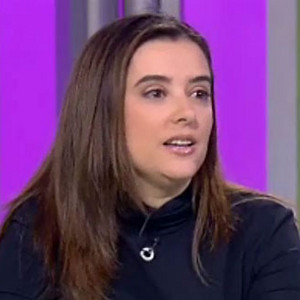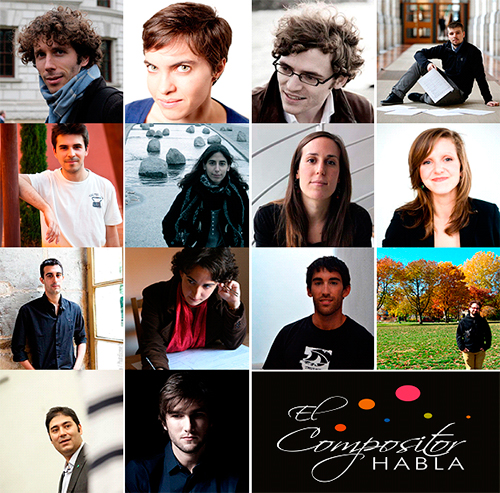Entrevistas
Bruno Letort | I am a listener / Soy un oyente
02/03/2016
Ruth Prieto, for ComposerSpeaks, interviews composer Bruno Letort
.jpg)
I am a listener
1. Ruth Prieto: Which characteristic defines you best?
Bruno Letort: Difficult question. I am a listener. For me it is important to listen. To listen to all the music, the sounds, my mind. And also I am like a sponge, we are sponges. I take a lot of information coming from everywhere and at the end you mix all this information and get your results, your information.
2. R.P.: What is composition for you in this day and age?
Bruno Letort: What should it be or what it is?. Difficult question again… I really liked it when Pierre Boulez said that you must mind new music and cut all the roots. You have to have roots but you also have to cut them because you know them. What is difficult for me is to be an original composer but with the audience. It is impossible to create new music without the audience because for me music is an exchange with others, with the audience.
.jpg)
I am a listener
1. Ruth Prieto: Which characteristic defines you best?
Bruno Letort: Difficult question. I am a listener. For me it is important to listen. To listen to all the music, the sounds, my mind. And also I am like a sponge, we are sponges. I take a lot of information coming from everywhere and at the end you mix all this information and get your results, your information.
2. R.P.: What is composition for you in this day and age?
Bruno Letort: What should it be or what it is?. Difficult question again… I really liked it when Pierre Boulez said that you must mind new music and cut all the roots. You have to have roots but you also have to cut them because you know them. What is difficult for me is to be an original composer but with the audience. It is impossible to create new music without the audience because for me music is an exchange with others, with the audience.
"The difficult part is to be free in a new way and to have a good connection with the audience, to be original, to have an original language and also to have an audience."
3. R.P.: What inspires you as a composer and why?
Bruno Letort: Drawings and the big screen. I like the cartoonist because cartoons are something very close to me from my childhood. But I also love the cinema. At the beginning, I wanted to be a film composer and it is funny that I became a composer because it was a moment when music for films was not so interesting. Now it is something that I regret a lot because the cinema is a mirror of life and also of music.
4. R.P.: What is your main obsession when working?
Bruno Letort: To get time! I can work with noise. I am used to working in a café with a lot of noise but also with a lot of energy. I have good concentration. This is not a problem but I need time.
5. R.P: Could you describe your creative process?
Bruno Letort: In fact all of us would like to write the best music ever and of course you never make it. I try in every work do it better than the time before. Arrive a step forward. Make the starting point where I finished last time. In my case there is a connection, a trajectory. If you listen to my work, very often you find connections between some of my pieces. I like to take little things and develop them like in a laboratory, for me it is like that. As I am a guitar player, I am accustomed to working with electronics and transforming sound. I also use improvisation a lot as a tool to work. Then I record and I see if there are parts that I particularly like. Then I develop them.
6. R.P.: What are you working on now?
Bruno Letort: I have just finished a piece for a vocal ensemble Vox Nova for Nicholas Isherwood. It is a love song. I also have finished some music for a film and I am going to write for Stephane Ginsburgh. I am going to write for May a piece for piano and I am working on my first opera, which is really big. I have just finished with David Torn and Daniel James Goodwin the recording of the music for "Trainworld", with scenography by François Schuiten and the sonographies by me on the Musicube label. It has been a very long project of two years of work.
7. R.P.: What are your musical roots (real or imaginary)?
Bruno Letort: I went to the Conservatoire and I studied classical music and then I was a guitar player in an autodidact way because I was not interested in the classical guitar but much more impressed by guitarists like Jimmy Hendricks and also by experimental guitar players. And at the beginning of my professional life, I was a professional guitar player. I did a lot of jazz rock but in my mind I always kept the taste of composing, to make new music. I was really interested in the 80s by computer music. I did a lot of experimenting in computer music, a lot of experimenting in the tempo.
8. R.P.: In this personal "inventory" that we all have of noises, sounds, music and songs, what can you tell us about your soundscape?
Bruno Letort: I don’t know why but I am really attracted by sounds, also by vocal sounds and rhythm. I like to play with the tempo, with the pulse….
9. R.P.: What is silence?
Bruno Letort: There is no silence. Even in ‘laboratory conditions’ it is not possible because you can hear your inner sounds and noises. When you try this special room, you realize that there is no silence at all. Silence in music is also music. It is also a moment to breathe to digest music.
10. R.P.: Have you got a composer of reference or someone who made a special impression on you as a composer?
Bruno Letort: Only one? For me there are three very important composers: Stravinsky his music, his approaches. During his life he changed the characteristics of his music a lot …music for a lot of different things: music dodecaphony, tonal, modal, for dance, for circus etc .. and he was always different and all of his facets were interesting.
Edgar Varèse. What I like about Varèse is that he cut the roots, he did new music, real new music. I think he is the most modern composer. He changed all music and he made new rules in music.
The third one, relatively unknown but very important for me, is Michel Colombier, a French composer who died some years ago. Michel Colombier was a great orchestrator but he was also able to make a bridge between classical music and popular music. With his orchestrations, he puts colour to sound in a wonderful way.
11. R.P.: Have you got any eccentricities when composing?
Bruno Letort: Yes rhythmical eccentricities. Very often when I write music I think this rhythm is too simple so I try and make it a bit more complex. …
12. R.P.: What do you expect from the future?
Bruno Letort: I hope to get time to write a lot of music. Because I'm a composer but also the director of a Festival. I started the Festival two years ago and I did not know then that it was going to take so much time (like I know today). I would like more time to compose. I enjoy being the director of this festival and a bridge between composers and audience but I would also like more time to compose.
13. R.P.: What have you not yet been asked to do in music?
Bruno Letort: A contemporary musical comedy, but truly…like a show…a genuine show … not Pierrot Lunaire
14. R.P.: What could you tell me about Ars música?
Bruno Letort: For me it’s a challenge. The Festival began a long time ago and now it takes place every two years in Autumn rather than Spring. Now with less budget, we have 50 concerts. For me is also important to open the festival to many different kinds of music: electronic, improvisation, for screens, for cinema, symphonic music, chamber music, traditional music, experimental music so we need to do a lot of things with young composers. We propose concerts to national radios in Europe. In Spring there are a lot of Festivals in Europe so we decided that in Autumn we could do better. And in the meantime we have a musical season Les Mardis Contemporaines.
Biblioteca
Destacamos ...
Nueva Sección Directorio
dedicada a la promoción de compositores, intérpretes, instituciones y editoriales.

dedicada a la promoción de compositores, intérpretes, instituciones y editoriales.



